

Coronastatus - Novus. NPR Choice page. BREAKING! French COVID-19 Research Reveals That The Hypothalamus Region Of The Brain Is Also A Target For The SARS-Cov-2 Coronavirus - Thailand Medical News. BREAKING!

French COVID-19 Research Reveals That The Hypothalamus Region Of The Brain Is Also A Target For The SARS-Cov-2 Coronavirus COVID-19 Research: A new French research has revealed that the hypothalamus region of the brain is a target area for the SARS-CoV-2 coronavirus as the researchers have also discovered that the region is rich with ACE-2 receptors and also TMPRSS2 receptors and that the SARS-CoV-2 brain invasion is through multiple routes, along the fact that sex hormones and metabolic diseases influence brain susceptibility. INTERESTING READ: Could Epstein-Barr Virus Explain Why Certain COVID-19 Patients Manifest Certain Symptoms While Others Are Asymptomatic? - Thailand Medical News.
INTERESTING READ: Could Epstein-Barr Virus Explain Why Certain COVID-19 Patients Manifest Certain Symptoms While Others Are Asymptomatic?

COVID-19 Research: When we are dealing with a new virus that there has not been much data or information till the last few 14 weeks, we should keep our options open when we are dealing with theories and hypothetic explanations as to date we have no confirmed prevention or treatment protocols nor vaccines except for lots of experimental drugs that have yet to have any proper clinical studies to support its use and all the treatment protocols currently being used are questionable especially when some emerging studies indicate that maybe some of these are actually contributing to the death rates. One of the things that have baffled researchers to date is as to why certain COVID-19 infected individuals exhibit symptoms while other do not.
Diaphragm Pain: Causes and Treatment. The diaphragm is a mushroom-shaped muscle that sits beneath your lower-to-middle rib cage.
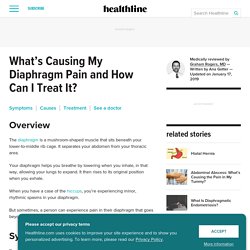
It separates your abdomen from your thoracic area. Your diaphragm helps you breathe by lowering when you inhale, in that way, allowing your lungs to expand. COVID-19 threatens the entire nervous system. A new review of neurological symptoms of COVID-19 patients in current scientific literature reveals the disease poses a global threat to the entire nervous system, reports a Northwestern Medicine study published this week in Annals of Neurology.
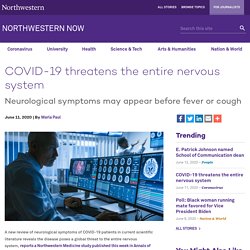
About half of hospitalized patients have neurological manifestations of COVID-19, which include headache, dizziness, decreased alertness, difficulty concentrating, disorders of smell and taste, seizures, strokes, weakness and muscle pain. “It’s important for the general public and physicians to be aware of this, because a SARS-COV-2 infection may present with neurologic symptoms initially, before any fever, cough or respiratory problems occur,” said lead author of the review, Dr. Igor Koralnik, Northwestern Medicine chief of neuro-infectious diseases and global neurology and a professor of neurology at Northwestern University Feinberg School of Medicine. In addition, the virus may cause direct infection of the brain and meninges.
COVID-19: also a systemic endotheliitis – University Hospital Zurich. April 20, 2020 COVID-19 was considered to be a lung disease.
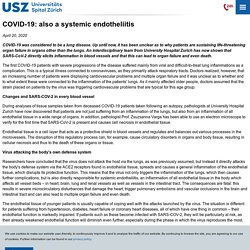
Up until now, it has been unclear as to why patients are sustaining life-threatening organ failure in organs other than the lungs. Vasculitis. Covid-19-infektion - Janusinfo.se. Utredning Förslag på inkomstprover vid covid-19: Blodstatus, B-celler, CRP, Prokalcitonin, Kreatinin, Na, K, ASAT, ALAT, Bilirubin, ALP, PK(INR).

Troponin-T, D-dimer, Ferritin + eventuellt en arteriell blodgas. Covid-19 akut försämring: Samma som inkomstprov. Virustest med PCR-teknik. Provtagning med ”viruspinne” i näsa/nasofarynx eller svalg. Antikroppstest. Blodstatus. P-CRP och S-Prokalcitonin. Leverprover. Troponin T vid bröstsmärta. D-dimer ofta kraftigt förhöjt i sjukhusbehandlade fall och ett värde >3 mg/l används ibland som inläggningsindikation. P-Ferritin. Blodgas + kvot PaO2/FiO2 enligt ovan. Lungröntgen (görs ej rutinmässigt) visar sprida, främst basala infiltrat och förtätningar. DT-thorax är en känsligare metod än lungröntgen och visar tidigt spridda infiltrat framför allt av av typen ”groundglass” förändringar. Sputum och blododling.
EKG. Övervakning Grunden är NEWS enligt åtgärdstrappa. Behandling Symtomatisk behandling Feber. Hosta. Smärta. Hypocortisolism in survivors of severe acute respiratory syndrome (SARS) - Leow - 2005 - Clinical Endocrinology. Introduction Ever since Singapore was stricken in March 2003 with severe acute respiratory syndrome (SARS), it became apparent that many survivors experienced chronic pulmonary morbidities and a multitude of psychosomatic manifestations.
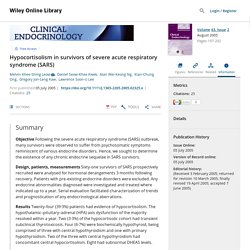
We hypothesize that an endocrinological basis could account for some of these extrapulmonary symptoms due to their resemblance to various hormonal and metabolic disorders that frequently feature nonspecific symptomatology.1 Studies have linked aberrations in the hypothalamic–pituitary–adrenal (HPA) axis to psychiatric conditions.2 Moreover, correlations of hypothalamo–pituitary–thyroid (HPT) axis dysfunction with certain psychosomatic syndromes have been described.3 The primary focus of this prospective study is to determine the existence of any chronic HPA axis sequelae in SARS survivors, while characterization of their prognostic outcomes and the presence of any HPT axis dysfunction constitutes its secondary objective. Patients and methods Results. COVID-19: First bowel imaging study implicates blood clots. People with COVID-19 often experience gastrointestinal symptoms.
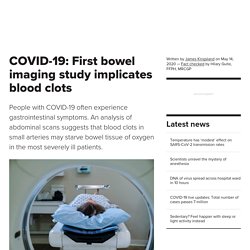
An analysis of abdominal scans suggests that blood clots in small arteries may starve bowel tissue of oxygen in the most severely ill patients. All data and statistics are based on publicly available data at the time of publication. Some information may be out of date. Visit our coronavirus hub and follow our live updates page for the most recent information on the COVID-19 outbreak. In the early stages of the COVID-19 outbreak in China, doctors believed the main symptoms to be fever, cough, muscle pain, and fatigue.
As case numbers rose worldwide, doctors increasingly noted gastrointestinal symptoms, such as diarrhea, nausea, vomiting, and abdominal pain. Liver damage is another recent observation, particularly in severely ill patients. COVID-19: First bowel imaging study implicates blood clots. COVID-19 'long-haulers' complain of symptoms lasting weeks and even months. TORONTO -- When Megan Desjardins attempts to garden these days, she has to take multiple breaks to catch her breath.

A recent walk on the beach with her family left her exhausted and in need of a long nap. In early June, her chest was sore, her nose was numb, her arms were weak, and she had to lean on a chair just to hold the telephone up to her ear. “You wake up every day thinking ‘OK, what pain is it going to be today? What am I going to experience today?’” She shared with CTVNews.ca during a call from her home in Comox, B.C. Desjardins believes she contracted COVID-19 during a trip to Costa Rica and Panama in January and February.
That was 85 days before she spoke to CTVNews.ca for this story. “I’m a healthy person normally,” she said. Coronavirus Resource Center. As coronavirus spreads, many questions and some answers The rapid spread of the virus that causes COVID-19 has sparked alarm worldwide.
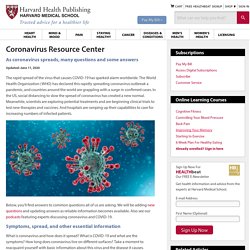
The World Health Organization (WHO) has declared this rapidly spreading coronavirus outbreak a pandemic, and countries around the world are grappling with a surge in confirmed cases. In the US, social distancing to slow the spread of coronavirus has created a new normal. Meanwhile, scientists are exploring potential treatments and are beginning clinical trials to test new therapies and vaccines. And hospitals are ramping up their capabilities to care for increasing numbers of infected patients. Below, you'll find answers to common questions all of us are asking. "Shocking": Nearly all who recovered from Covid-19 have health issues months later. Many recovered coronavirus patients who did not need to be hospitalized are still facing serious health problems months later, according to a study commissioned by the Longfonds.
While 94 percent say they do not feel as healthy as they did before the viral infection, some 60 percent of this group said they still have breathing symptoms which make it difficult to take a walk, and nearly half are unable to exercise, Longfonds director Michael Rutgers said in a statement. "We find this really shocking. " The Longfonds, treatment center CIRO, and Maastricht University surveyed 1,600 people who reported they had symptoms after recovering from the coronavirus.
Rutgers said it was the first time that these patients have really come into the picture, as most were never treated in medical centers. We need a Nightingale model for rehab after covid-19. The Long-Term Effects Of Covid-19: What I'm Experiencing 5 Months Later. To give you some context, I’m not your typical Coronavirus victim. I’m a 40 year-old doctor, a former professional athlete and ironman triathlon winner with no pre-existing health conditions.
Back in January, two weeks after returning from a trip to Thailand, I started feeling a bit unwell, initially it was a sore throat which turned into a mild chest infection and high fever. 5 tecken på att coronaviruset angriper hjärnan. BREAKING! French COVID-19 Research Reveals That The Hypothalamus Region Of The Brain Is Also A Target For The SARS-Cov-2 Coronavirus - Thailand Medical News.